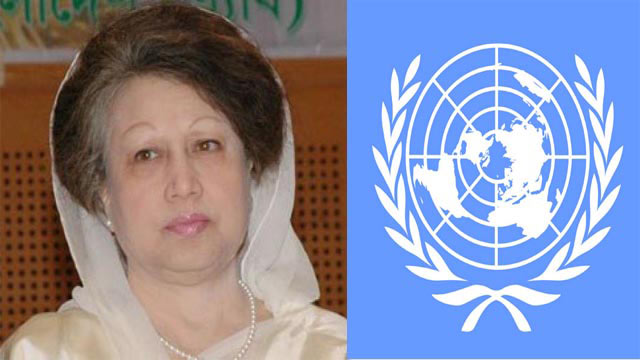M Mushfiqul Fazal from UN Headquarter, Feb 8 (Just News): Deputy Spokesman for the UN Secretary-General Farhan Haq said “we’re just monitoring what the latest developments regarding this verdict are, and we expect that we'll say something more once we've evaluated the situation. It's too early to judge what impact this will have, but, yes, we do continue to call for an inclusive and democratic process in the country”.
The Spokesman for the UN Secretary-General made this comment on Thursday at noon briefing at UN Headquarter in reply to a question of Just News BD editor M Mushfiqul Fazal.
At briefing journalist Mushfiqul asked from this podium, many times you said, and the Secretary-General is urging for inclusive, participatory election, but with this verdict of the main opposition, Begum Khaleda Zia, do you think still there is a hope to hold a free, fair and credible election in Bangladesh? One. Second question is: Bangladesh, do you think the rule of law… currently Bangladesh prevailing, the rule of law is established, because the chief justice is forced to leave the country and the rule of law… the judiciary is very controversial… so what is your comment about this verdict on main opposition Begum Khaleda Zia and his… her son, Tarique Rahman?
In reply Farhan said “Well, as I just mentioned we're just monitoring what the latest developments regarding this verdict are, and we expect that we'll say something more once we've evaluated the situation. It's too early to judge what impact this will have, but, yes, we do continue to call for an inclusive and democratic process in the country.”
Question and answer script on Bangladesh issue is given below:
Question: Thank you, Mr. Farhan. Just to supplement my colleague, as he said this current situation in Bangladesh: Do you… from this podium, many times you said, and the Secretary-General is urging for inclusive, participatory election, but with this verdict of the main opposition, Begum Khaleda Zia, do you think still there is a hope to hold a free, fair and credible election in Bangladesh? One. Second question is: Bangladesh, do you think the rule of law… currently Bangladesh prevailing, the rule of law is established, because the chief justice is forced to leave the country and the rule of law… the judiciary is very controversial… so what is your comment about this verdict on main opposition Begum Khaleda Zia and his… her son, Tarique Rahman?
Deputy Spokesman: Well, as I just mentioned we're just monitoring what the latest developments regarding this verdict are, and we expect that we'll say something more once we've evaluated the situation. It's too early to judge what impact this will have, but, yes, we do continue to call for an inclusive and democratic process in the country.
Question: This is Imran Ansary. I would like to draw your attention to Bangladesh. You may know that former Prime Minister of Bangladesh and key opposition leader Begum Khaleda Zia was jailed for five years for corruption. After her verdict, tens of millions… thousands people coming to the street to protest against this politically motivated verdict. Police imposed [inaudible] and used live bullets to demolish these protests. Thousands of opposition activists have been arrested, as far as the media reports. You may know that the general election will be held this upcoming December, and political experts already told the media after his verdict, it is the process to eradicate Begum Khaleda Zia and her son, Tarique Rahman, from the general election. In this connection, what types of initiatives taken by Secretary-General? And could he send any special envoy to Bangladesh to resolve the political crisis?
Deputy Spokesman: Well, first of all, we only recently received the report concerning the arrest and the subsequent events. We're monitoring what the events are on the ground and we will react accordingly. We would, of course, be concerned about any reports of violence and at this point, we call on all sides to maintain calm and we expect to have a further reaction after we've evaluated the situation further.
Question: Thanks. I wanted to first to follow up on… on…. on Bangladesh. I mean, you had said… the arrest took place some time ago, and various countries have put out already travel warnings, so I'm wondering, at a minimum… the UN with its country team there, have they taken note of what's taking place in the street?
Deputy Spokesman: I've told you what I've got on that for now.
Question: And given that there's live fire, you say… very recently, DPKO [Department of Peacekeeping Operations] put out a statement thanking Bangladesh for its peacekeepers, and I'm sure they've done great work, but there have been repeated issues of abuses by the security forces, or seeming abuses, killing of civilians, use of live fire on protesters. Can you describe what vetting goes on, and… and the recent spate of… of these thank you, messages put out by DPKO, are they in any relation to… to… to the vetting process that's going on or issues that have arisen in various delegations, contingents of peacekeepers?
Deputy Spokesman: All peacekeepers are vetted to make sure that they have not engaged in any practices that involve the violation of human rights. And we go through that on a country-by-country basis.
Question: And so have there been any Bangladesh peacekeepers blocked in the last five years, given the events in the country in which units by name have taken place in crackdowns on their own civilians?
Deputy Spokesman: We raise all concerns with any particular members of incoming peacekeeping troops with the troop-contributing country to make sure that no one is deployed who does not meet our standards.
(Justnews/ys/1700hr)





